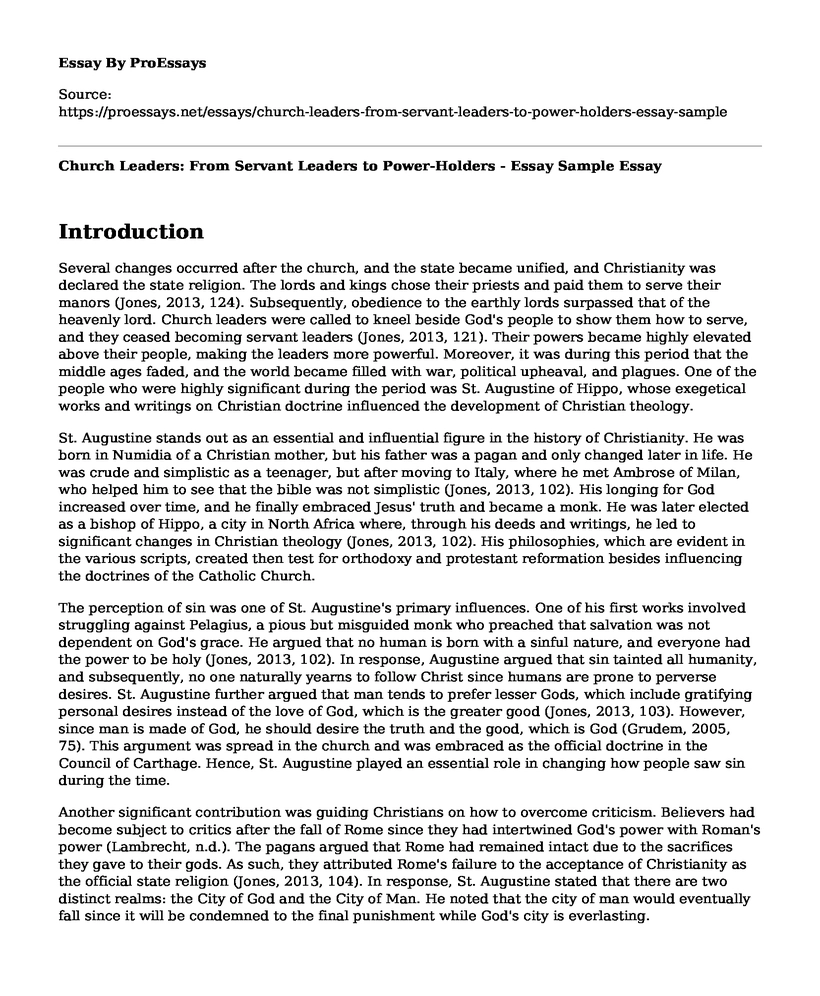Introduction
Several changes occurred after the church, and the state became unified, and Christianity was declared the state religion. The lords and kings chose their priests and paid them to serve their manors (Jones, 2013, 124). Subsequently, obedience to the earthly lords surpassed that of the heavenly lord. Church leaders were called to kneel beside God's people to show them how to serve, and they ceased becoming servant leaders (Jones, 2013, 121). Their powers became highly elevated above their people, making the leaders more powerful. Moreover, it was during this period that the middle ages faded, and the world became filled with war, political upheaval, and plagues. One of the people who were highly significant during the period was St. Augustine of Hippo, whose exegetical works and writings on Christian doctrine influenced the development of Christian theology.
St. Augustine stands out as an essential and influential figure in the history of Christianity. He was born in Numidia of a Christian mother, but his father was a pagan and only changed later in life. He was crude and simplistic as a teenager, but after moving to Italy, where he met Ambrose of Milan, who helped him to see that the bible was not simplistic (Jones, 2013, 102). His longing for God increased over time, and he finally embraced Jesus' truth and became a monk. He was later elected as a bishop of Hippo, a city in North Africa where, through his deeds and writings, he led to significant changes in Christian theology (Jones, 2013, 102). His philosophies, which are evident in the various scripts, created then test for orthodoxy and protestant reformation besides influencing the doctrines of the Catholic Church.
The perception of sin was one of St. Augustine's primary influences. One of his first works involved struggling against Pelagius, a pious but misguided monk who preached that salvation was not dependent on God's grace. He argued that no human is born with a sinful nature, and everyone had the power to be holy (Jones, 2013, 102). In response, Augustine argued that sin tainted all humanity, and subsequently, no one naturally yearns to follow Christ since humans are prone to perverse desires. St. Augustine further argued that man tends to prefer lesser Gods, which include gratifying personal desires instead of the love of God, which is the greater good (Jones, 2013, 103). However, since man is made of God, he should desire the truth and the good, which is God (Grudem, 2005, 75). This argument was spread in the church and was embraced as the official doctrine in the Council of Carthage. Hence, St. Augustine played an essential role in changing how people saw sin during the time.
Another significant contribution was guiding Christians on how to overcome criticism. Believers had become subject to critics after the fall of Rome since they had intertwined God's power with Roman's power (Lambrecht, n.d.). The pagans argued that Rome had remained intact due to the sacrifices they gave to their gods. As such, they attributed Rome's failure to the acceptance of Christianity as the official state religion (Jones, 2013, 104). In response, St. Augustine stated that there are two distinct realms: the City of God and the City of Man. He noted that the city of man would eventually fall since it will be condemned to the final punishment while God's city is everlasting.
Augustine also transformed the perception of Christian communion. A section of Christians known as the Donatists had caused significant dissension in the church. Their leaders gave in to the demands of Emperor Diocletian to evade persecution and surrendered scriptures and Christian books to be burnt Lambrecht, n.d.). This act was seen as a form of betrayal, leading to separation from Donatists, forming a separate sect of faith and regarded it as the true church (Jones, 2013, 104). Augustine saw this division as harming the unity created by the body of Christ. He, therefore, condemned Donatism's statement on what true Christianity means: in catholic communion held by the bond of mutual charity and love. Thus love and charity were seen as one. Conversely, he urged other Christians to handle Donatists with love and tolerance. His position on this issue contributed significantly to the discussions on Donatism during the Council of Carthage.
Overall, there were profound changes after Christianity became an official religion. These transformations marked a shift from supplication to God to showing obedience to man. Church leaders became exceedingly mighty, and servant leadership faded. St. Augustine was impactful during the time as his philosophical teachings and writings changed the perspective of believers of various issues, including sin, love, and Christian communion. His work was widely discussed during the Council of Carthage, causing several changes in the Christian doctrine. His various writings presented a clear roadmap on orthodoxy in the church besides guiding on the accepted Christian ethics. As such, Augustine played a critical role in the development of Christian theology.
References
Grudem, W. (2005). Christian beliefs. Grand Rapids: Zondervan.
Jones, T. P. (2013). Rose Bible Basics: Christian History Made Easy. Rose Publishing, Inc.
Lambrecht, E. (n.d.). Why was St. Augustine so important in Christian history?. Retrieved from https://dailyhistory.org/Why_was_St._Augustine_so_important_in_Christian_History%3F.
Cite this page
Church Leaders: From Servant Leaders to Power-Holders - Essay Sample. (2023, May 11). Retrieved from https://proessays.net/essays/church-leaders-from-servant-leaders-to-power-holders-essay-sample
If you are the original author of this essay and no longer wish to have it published on the ProEssays website, please click below to request its removal:
- How Confucianism Has Served as a Unifying Cultural Force in East Asia
- Incarnation and Presence in Religion Essay Example
- Essay Sample on Culture's Viewpoint on Christianity
- The Confucianism Effect on Chushingura Paper Example
- Essay Example on Promise-Keeping: Morally Crucial for Trust, Security and Character
- Essay Example on Brahma & Indra: Protectors of Buddhist Teachings
- Intelligent Designer - Research Paper Sample







